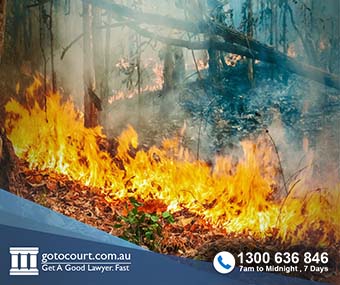Arson Offences and Bush Fires (WA)
Arson offences are among the most serious criminal offences that Western Australian courts deal with. Criminal damage by fire attracts a maximum penalty of life imprisonment. Arson offences in Western Australia have caused massive financial losses, deaths and the destruction of homes, buildings and historic sites. Arson is a notoriously easy offence to commit and a notoriously difficult one to detect. The Western Australian Police offer a reward of up to $25,000 to members of the community who supply information that leads to the conviction of an offender for an arson offence.
Arson offences under the Criminal Code
The legislation relating to arson offences was amended in 2009, with tougher penalties and new offences inserted into the Criminal Code in the wake of the Black Saturday bushfires in Victoria, which killed 173 people.
Criminal damage
Section 444 of the Criminal Code Compilation Act 1913 makes it an offence to destroy or damage property. If the destruction or damage is caused by fire, this offence is now punishable by a maximum penalty of life imprisonment.
Duty of person in control of fire
Section 444A provides that a person who is in control of a source of ignition or a fire has a duty to use reasonable car and take reasonable precautions to avoid it destroying or causing damage to property. A breach of this duty is punishable by a maximum penalty of imprisonment for 15 years.
Damaging property
Section 445 provides that a person commits an offence if they unlawfully destroy or damage the property of another person without that person’s consent. The offence carries a maximum penalty of imprisonment for two years and a fine of $24,000.
Jurisdiction
All arson offences are dealt with by the Supreme Court of Western Australia as they carry a maximum penalty of life imprisonment.
The Bush Fires Act
In addition to the arson offences under the Criminal Code, the Bush Fires Act 1954 also contains a number of offences relating to the irresponsible use of fire. It also imposes a number of restrictions and prohibitions for the prevention of bushfires and sets out how bushfires are to be managed in Western Australia, extending broad powers to bush fire control officers.
Lighting a fire
Section 32 of the Bush Fires Act 1954 makes it an offence to light or attempt to light a fire or to place a flammable thing or substance in a position that it may ignite or be set on fire in circumstances where it is likely to injure a person or damage a property. This offence is punishable by a maximum penalty of imprisonment for 20 years.
Disposing of burning cigarettes
Section 30 of the Bush Fires Act makes it an offence to dispose of a burning cigarette, cigar or match during a prohibited or restricted burning time in circumstances where it is likely to set fire to the bush, or by throwing it from a vehicle. The maximum penalty for this offence is a fine of $5,000.
Giving a false alarm
Under Section 27B of the Bush Fires Act, it is an offence to knowingly give a false alarm of fire to a bush fire authority and this is punishable by a maximum penalty of a fine of $5,000.
Powers of bush fires control officers
The Bush Fires Act gives bush fire control officers the power to do anything that is necessary for the control or extinguishment of a bush fire. This includes entering any land or building, pulling down fences or building, taking and using water from any source, clearing fire breaks and cutting off electricity.
Prohibited and restricted burning times
The Minister for Environment and Conservation can declare a prohibited burning time or a restricted burning time. It is an offence to set a fire during a prohibited burning time unless a permit is obtained to complete burning off during this time. It is also an offence to set a fire during a restricted burning time, but there is a much wider range of permits that can be granted during such a time.
Total fire ban
The Minister may declare a total fire ban for any area and this takes precedence over any prohibited or restricted burning times. During a total fire ban it is an offence to light any fire without the express permission of the Minister.
If you require legal advice representation in relation to arson offences or in any other legal matter please contact Go To Court Lawyers.








